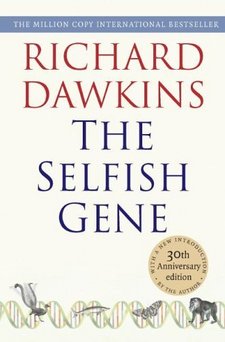We’ve just sent out the new 30-year-anniversary edition to the TED bookclub (made up of those people signed up for TED2007). Here’s the reason I gave for its selection.
 Now why would we send out a 30-year-old book? Well, first of all, we suspect that despite its fame and influence, only a minority of TEDsters have actually read it. After all, 30 years ago, many of us weren’t on the same intellectual journey that membership of TED today implies. Secondly, the new edition has a terrific new introduction by Dawkins.
Now why would we send out a 30-year-old book? Well, first of all, we suspect that despite its fame and influence, only a minority of TEDsters have actually read it. After all, 30 years ago, many of us weren’t on the same intellectual journey that membership of TED today implies. Secondly, the new edition has a terrific new introduction by Dawkins.
But most importantly, even today, three decades later, the remarkable insights of this book aren’t properly understood. A lot of people seem to think the book is arguing for a view of the world "red in tooth and claw". That selfishness underpins everything.
This is a profound misunderstanding of the idea. One of my biggest personal "aha" moments ten years ago came from the book’s insight that the interests of our genes and ourselves are not identical. That actually it can be in the interest of "selfish" genes to build unselfish humans. As Dawkins himself has commented, when you read the title, the emphasis should be on the word "gene", not on the world "selfish". He’s saying that the way to think about "survival of the fittest" is at the level of the gene. It’s genes that are selfish, not necessarily the organisms they create.
But there are multiple other implications of this idea. It gives us cause to carefully question many of our instincts and psychological tendencies, including our beliefs about what will make us happy. These feelings may have a powerful evolutionary purpose (for our genes), but are they in OUR interest? Not always. This is a powerful new lens through which to think about yourself.
Others feel Dawkins’ whole agenda is a depressingly reductionist view of the world… a thought that’s encouraged, perhaps, by Dawkins’ own icy speaking style and trenchant anti-religious views and by selective quotes such as that we are simply the "survival machines" our genes create. But the book encourages us to get beyond this and instead to be awed by the richness of a nature that can build creative, communicative, feeling, loving beings from a mindless evolutionary startpoint. That feeling of awe simply grows when you reach the book’s final chapter and its famous (and still controversial) introduction of the notion of "memes": that our ideas may literally have a life of their own.
Whether or not you’ve read The Selfish Gene, I urge you to give this edition your attention. It’s brilliantly written and profound. It may shock. But ultimately, I think it’s exhilarating.
I’d be intrigued to hear from others on their reaction to this book. It certainly set some powerful memes loose in my brain….